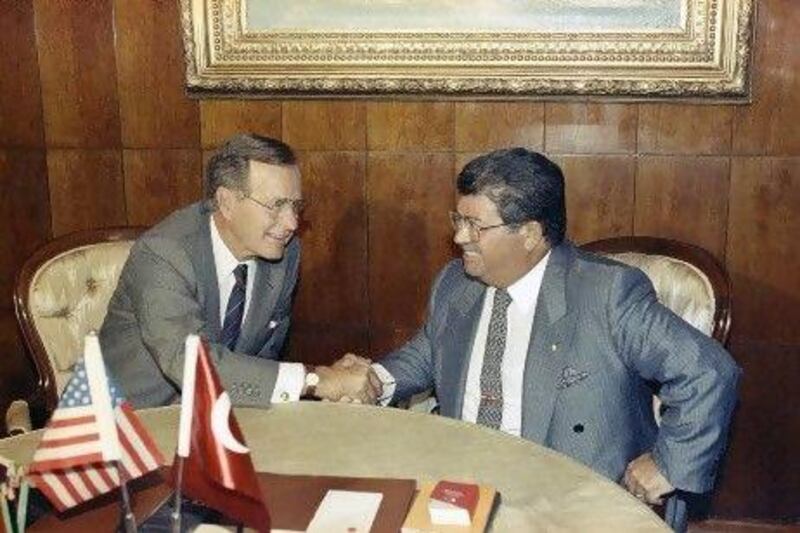ISTANBUL // He once reviewed a military parade in shorts and a T-shirt, was shot in the finger in a botched attempt on his life and, some say, was killed by assassins who laced his orange juice with poison.
To find out the truth about the death of the former Turkish premier and president, Turgut Ozal, Turkey is digging up its past.
After receiving a report by special investigators, the state prosecutor in Ankara this month ordered Ozal exhumed.
Forensic experts will be looking for evidence that suggests Ozal, who served as the country's president from 1989 until his death in 1993, was murdered. No date has been set for the exhumation.
A pious, jovial and chubby man with a history of heart problems, Ozal was working on a political solution for Turkey's Kurdish conflict when he died at 65.
As prime minister, he was credited with launching reforms that triggered an economic boom in the early 1980s, and with reining in Turkey's powerful military when he was president.
Rumours that Ozal was murdered, possibly from members of the state security forces who resisted his efforts to find a peaceful solution to the Kurdish problem, have lingered for years.
Media reports have said that shortly before his death, Mr Ozal opposed the adoption of a counter-guerrilla strategy by the state, including the deployment of right-wing hit men, to hunt down leaders and alleged sympathisers of Kurdish rebels. Members of the security forces, known collectively as the "deep state", are accused of thousands of extrajudicial killings in the Kurdish area in the 1990s.
But it was only when Abdullah Gul, the current president, asked the State Supervisory Council (DDK), a unit of special investigators in his office, to look at the circumstances of Ozal's death that rumours gained some traction
In the DDK report, released in June after 18 months of investigation, the five detectives noted that even though "the sudden death of a sitting president should always be treated as suspicious", authorities did not have an autopsy performed and did not gather evidence after Mr Ozal died on April 17, 1993.
"This is a situation that can be described as an 'eclipse of reason'," the report said. It added the speculation about Ozal's death could only be investigated further once the cause of death was known.
Semra Ozal, the late president's widow, has maintained that her husband was poisoned. Turkish newspapers reported last week that investigators were concentrating on orange juice that the president was served during a reception a day before his death.
Members of Ozal's family have expressed doubts about the upcoming exhumation.
Media reports claim that Ozal's son Efe has asked the prosecution to call off the exhumation. Ozal's daughter Zeynep told the Hurriyet newspaper this week that the family was uneasy with the prospect of disturbing her father's rest, even though the family wanted to know the details behind her father's death.
"In our faith, this is not right," Ms Ozal told the newspaper, in reference to the exhumation. She also said the exhumation could have wide-ranging consequences for Turkey.
"If the exhumation proves that my father was poisoned, that will be a shame for the Turkish republic," she said. "It will be clear that a great president was killed in this country."
As the public waits for the exhumation, police have increased security around the grave in Topkapi Cemetery, just outside the ancient city walls of Istanbul, where the former president is buried. The monumental grave consists of a soaring metal arch over a sarcophagus of red stone.
On a recent day, some visitors of the cemetery expressed doubts as to whether the exhumation makes sense.
"What can possibly come out of this?" asked Bulent Aktas, 38, who had come to the cemetery to visit a grave of a relative. "There's nothing left anyway."
Yet, almost 20 years after his sudden death, Ozal remains a revered figure for Turks. Policemen at the cemetery said an average of 40 to 50 people visited the former president's grave every day.
"He was a good president," Cemil Bulut, 68, a visitor at the cemetery, said about Ozal. "Everyone says he was poisoned. They also killed Menderes," he added in reference to Adnan Menderes, a former Turkish prime minister who was executed in 1961, following a military coup a year earlier. Ozal is buried close to Menderes on the same cemetery.
Mehmet, a 63-year-old man at the cemetery who only would give his first name, said he supported the decision to open Ozal's grave. "The public has doubts, so it's good that those doubts will be cleared up," he said.
But he was unsure as to whether Ozal was murdered.
"We have a history of leaders being assassinated going back to the Ottomans," Mehmet said. "And Ozal himself was attacked before he was killed," he noted. In 1988, an attacker fired shots at Ozal during a speech, wounding his finger.
But at the time of his death, Ozal was known to have serious heart problems, undergoing triple bypass surgery in 1987. "It could have been a natural death," Mehmet said. "Anyway, even if they find out that it was murder, they will only know that he was killed, not by whom."
tseibert@thenational.ae






